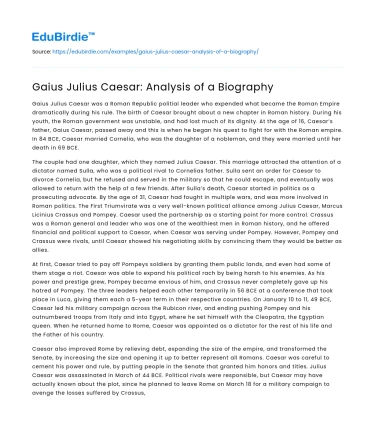Gaius Julius Caesar was a Roman Republic politial leader who expended what became the Roman Empire dramatically during his rule. The birth of Caesar brought about a new chapter in Roman history. During his youth, the Roman government was unstable, and had lost much of its dignity. At the age of 16, Caesar’s father, Gaius Caesar, passed away and this is when he began his quest to fight for with the Roman empire. In 84 BCE, Caesar married Cornelia, who was the daughter of a nobleman, and they were married until her death in 69 BCE.
The couple had one daughter, which they named Julius Caesar. This marriage attracted the attention of a dictator named Sulla, who was a political rival to Cornelias father. Sulla sent an order for Caesar to divorce Cornelia, but he refused and served in the military so that he could escape, and eventually was allowed to return with the help of a few friends. After Sulla’s death, Caesar started in politics as a prosecuting advocate. By the age of 31, Caesar had fought in multiple wars, and was more involved in Roman politics. The First Triumvirate was a very well-known political alliance among Julius Caesar, Marcus Licinius Crassus and Pompey. Caesar used the partnership as a starting point for more control. Crassus was a Roman general and leader who was one of the wealthiest men in Roman history, and he offered financial and political support to Caesar, when Caesar was serving under Pompey. However, Pompey and Crassus were rivals, until Caesar showed his negotiating skills by convincing them they would be better as allies.
At first, Caesar tried to pay off Pompeys soldiers by granting them public lands, and even had some of them stage a riot. Caesar was able to expand his political rach by being harsh to his enemies. As his power and prestige grew, Pompey became envious of him, and Crassus never completely gave up his hatred of Pompey. The three leaders helped each other temporarily in 56 BCE at a conference that took place in Luca, giving them each a 5-year term in their respective countries. On January 10 to 11, 49 BCE, Caesar led his military campaign across the Rubicon river, and ending pushing Pompey and his outnumbered troops from Italy and into Egypt, where he set himself with the Cleopatra, the Egyptian queen. When he returned home to Rome, Caesar was appointed as a dictator for the rest of his life and the Father of his country.
Caesar also improved Rome by relieving debt, expanding the size of the empire, and transformed the Senate, by increasing the size and opening it up to better represent all Romans. Caesar was careful to cement his power and rule, by putting people in the Senate that granted him honors and titles. Julius Caesar was assassinated in March of 44 BCE. Political rivals were responsible, but Caesar may have actually known about the plot, since he planned to leave Rome on March 18 for a military campaign to avenge the losses suffered by Crassus, but he died 3 days too soon.






 Stuck on your essay?
Stuck on your essay?

